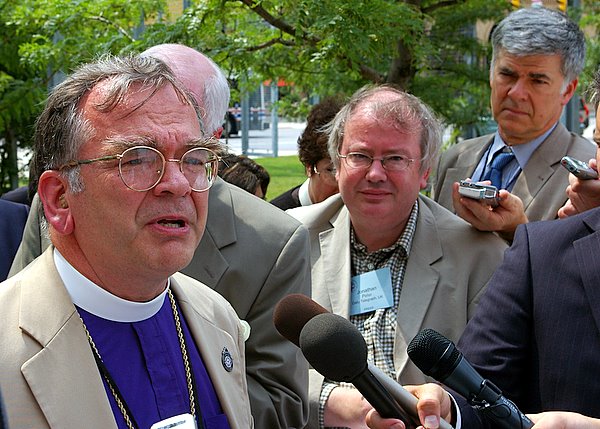PITTSBURGH: Diocese of Pittsburgh Bishop Responds to Charges by The Episcopal Church
Duncan says he and diocese are rightful owners of all properties
By David W. Virtue
www.virtueonline.org
5/20/2009
 The Rt. Rev. Robert Duncan and the Diocese of Pittsburgh have responded to charges filed by Calvary Episcopal Church and supported by The Episcopal Church that he and the Diocese of Pittsburgh are not the rightful owners of all diocesan assets, properties and parishes.
The Rt. Rev. Robert Duncan and the Diocese of Pittsburgh have responded to charges filed by Calvary Episcopal Church and supported by The Episcopal Church that he and the Diocese of Pittsburgh are not the rightful owners of all diocesan assets, properties and parishes.
(The Episcopal Church is attempting to seize all parishes and diocesan headquarters property arguing that Pittsburgh Bishop Robert Duncan has been deposed and is therefore not the rightful owner of diocesan assets.)
In papers filed in Allegheny County, PA on May 19, 2009, Bishop Duncan asserts that the Diocese is the rightful owner of all diocesan property. Furthermore, he denies that David Booth Beers represents TEC (he is Jefferts Schori's personal attorney) and that Bishop John C. Buchanan, the bishop of the newly formed diocese, has the authority to speak for TEC.
Bishop Duncan and the diocese specifically deny that TEC is a hierarchical religious denomination or that dioceses are "subordinate entities," arguing that TEC is a confederation of equals and that General Convention was not designed as the highest branch of TEC, nor does it have hierarchical authority over a diocese. Dioceses are constitutionally and canonically free to nullify any legislative enactment by the General Convention with which they disagree, lawyers for Duncan argue.
The General Convention had nothing whatsoever to do with the creation of the founding dioceses; it was the founding dioceses that created the General Convention in 1789.
TEC does not have an executive department as the Office of Presiding Bishop is primarily a ceremonial office. The PB does not have a see nor does she exercise ordinary power, said Duncan's lawyers.
Bishop John C. Buchanan has no authority to assert claims on behalf of TEC nor does the Presiding Bishop have the authority to state the position of The Episcopal Church with respect to issues of litigation.
Duncan's attorneys are arguing that the diocese's withdrawal from TEC was valid and that neither the Dioceses' Constitution and Canons, nor those of TEC prohibit the Diocese from withdrawing from TEC.
http://www.virtueonline.org/portal/content/duncan_ans_09-05.pdf
END













